-
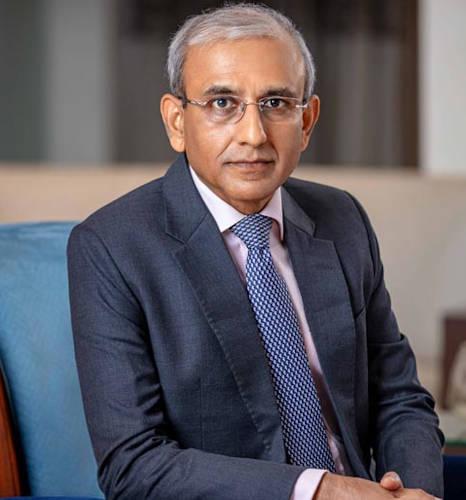
Shaparia: we are not gunning for ranking, but we need to be adding value for our clients
While the ‘not being in the business purely for market share’ line is one that is echoed by most of Bhatia’s colleagues, most of them are reluctant to have the bank categorised as a niche player. But, ultimately, it may just have been its traditional strength in niche areas that has got Deutsche Bank to where it is today.
As it marks 40 years in India this year, the German bank has become one of the four largest foreign banks in the country, with a balance sheet in excess of Rs1 lakh crore. Its three larger peers – Citibank, HSBC and Standard Chartered – have all been in the country for over 100 years. “The mindset every Deutsche Bank employee works with is to provide solutions for the client,” says Srinivas Varadarajan, Head, Fixed Income & Currencies Trading, DB. “The service itself becomes a by-product. The repeat business we are able to generate is driven by our ability to create value for our clients. We have to ensure that the quality of our execution remains consistent across years and cycles.” Based on a recent survey by an international publication, Deutsche Bank ranks as the number one provider of foreign exchange (FX) services in India with a market share of 22 per cent.
But it certainly has not been smooth sailing for the bank through the years. In 2011 it exited the credit cards business, after it realised it was not going to be able to build scale in the low-margin business, selling it to IndusInd Bank. A few years later, in 2015, Deutsche Bank exited asset management, selling the business to Pramerica Mutual. And only last year, as part of the bank’s global transformation strategy, the cash equities business was shut down. And then, of course, the bank has had to deal with market murmurs for years about whether it was serious about its retail and wealth businesses.
In July last year, Deutsche Bank announced its most radical transformation plan in decades when it took the bold call of shutting down its global equities business, simplifying its business lines and saying it would let go of 18,000 of its staff across the world. That strategy is working its way through a three-and-a-half-year timeline and, by December 2022, the bank expects to be a leaner and more efficient version of its current self.
As taken aback as investors and analysts were by the announcement, they welcomed it. The stock price has clawed back and this year, despite the pandemic, has been the best performing bank stock among its global peers. The stock was up 14 per cent year to date the end of October. Though the Indian operations have been largely unscathed by the transformation announcement, it has had to shutter the cash equities trading platform – a business that was hugely profitable.
But, “the bank remains well-positioned and has the opportunity to grow consistently in its chosen lines of business,” feels Shaparia. “We are not gunning for rankings so we do not want to be the biggest for the sake of being the biggest. We would certainly like to grow but we need to be adding value for our clients.”
-
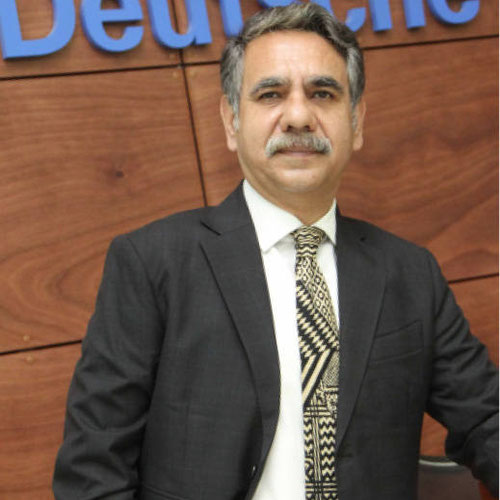
Bhatia: we are not in the business purely for market share
So, what cuts it for clients and what is the value they are looking for? “Clients today want banking partners who are prepared to make the investments to help them take their business to the next level. They want partners who will go the whole mile,” says Sriram Krishnan, co-head, global transaction banking & head of securities services.
Key strengths
Rajesh Thakur, who runs Deutsche Bank’s global transaction banking business, along with Krishnan, and directly oversees the cash management and trade finance businesses, says that one of Deutsche Bank’s key strengths has been its experienced relationship managers with strong subject matter knowledge. “It is not just about having a strong understanding of the services we provide our clients. It is as much about our RMs having a good understanding and perspective of the industries and companies they support. This has helped us become a trusted advisor to not only our existing clients but also to companies that are looking to set up in the country,” explains Thakur.
“We have been dealing with Deutsche Bank for over 12 years now,” acknowledges Saurabh Nanavati, CEO, Invesco Asset Management & vice-chair, Association of Mutual Funds of India. “Apart from the quality of the talent it has in supporting us, by virtue of it’s being the biggest custody services provider in the country, it sits on various regulatory committees and is able to offer clients like us tremendous guidance and advice on regulatory matters. Being the biggest has its advantages.”
Deutsche Bank’s global transaction banking business is today acknowledged as a dominant force in the banking business. Its securities services division has a nearly 40 per cent share of the overall custodial services market and the cash management division processes 70 per cent of e-commerce flows and 100 per cent of airline flows in the country.
“In our conversations with clients, the big challenge they tell us they face is liquidity management through their supply chain, changing consumer behaviour, business models & ESG compliance. Besides financial products clients need banks with good understanding of their business to enable data led solutions on changing models from “sell” to “pay per use”, real time API led solutions for digitizing processes and ability to deliver suitable financing solutions globally. We need to move in sync with our clients’ demands and think about how we’re going to customise our offerings in a manner that best meets their needs. Our balance sheet strength, global network, industry knowledge and understanding of technology all come together in creating the right solutions for clients,” says Shyamal Malhotra, Head of Corporate Bank Coverage.
But even as the German bank marks its 40th anniversary in the country, 2020 is turning out to be a watershed for the Indian economy – just like in other countries across the world. The International Monetary Fund (IMF) expects the Indian economy to contract by over 10 per cent in 2020-21, though the Reserve Bank of India sees the economy contracting by a more modest 9.5 per cent.
Banks, the fortunes of which typically mirror the vicissitudes of the economies they operate in, must prepare for a rough road ahead. By the end of the current financial year, the Indian banking industry is expected to ratchet up non-performing assets (NPA) to the tune of Rs2 lakh crore by some estimates, the bulk of the pain being borne by public sector banks. Foreign banks, by virtue of the client segments they focus on, will be a lot less impacted though they will also feel the pain.
-
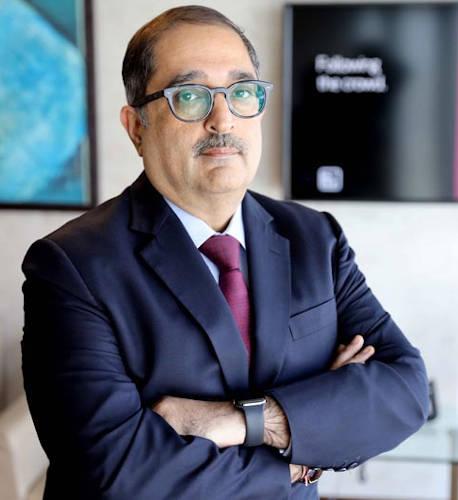
Chawla: leaders in distressed assets business
The impact of Covid-19 is likely to result in Rs1.67 lakh crore of debt from the top 500 debt-heavy private sector borrowers turning delinquent between 2020-21 and 2021-22, according to India Ratings. In the worst-case scenario, corporate stress could increase by a further Rs1.68 lakh crore, according to the ratings agency.
But Sanjay Agarwal, one of the most highly regarded dealmakers in Corporate India, has a different take. Agarwal, who, as executive chairman, corporate finance, oversees Deutsche Bank’s investment banking business, argues that Deutsche Bank’s greatest strength has been its ability to take on and manage risk. “Financing is our bread and butter business and this year is in fact proving to be a particularly good one,” says he, speaking specifically of the investment banking business. “We have a good opportunity to work through our global network, for instance, with MNCs looking to come into India. If anything, opportunities are only going to open up further, despite the current environment.”
A big competitive advantage that Deutsche Bank has is its dominant presence in the distressed assets business. As more and more companies, bludgeoned by the impact of the pandemic, seek out help, the bank, in an arguably perverse way, stands to benefit. “We have a leadership position in providing structured solutions in the credit business as a whole so we do have an edge in the current environment,” says Rahul Chawla, head, global credit trading, which houses the bank’s distressed assets business. Chawla also co-heads investment banking coverage with Agarwal. “As the industry comes out of this environment, you will see the dichotomy of bigger players becoming bigger and smaller players either consolidating or falling away. M&A activity will continue to play a significant role in this. Many of the available underlying assets have value and there will be buyers.”
Opportunities for growth
The process of consolidation that began with demonetisation in 2016 is only set to accelerate with the pandemic. A recent study by BofA Securities has found that the market share of the top five players in the consumer, financials, real estate, communications services and energy sectors increased from 60 per cent in 2016 to 62 per cent and is set to increase further due to the pandemic.
“Over the next few years, you are going to see consolidation in the more capital-intensive industries,” contends Agarwal. “It has already begun playing out in telecom, NBFCs, banks and the steel sectors but the pace will pick up. Until some years ago, every second businessman you met owned a steel mill. That’s not the case anymore”.
As Deutsche Bank continues to see opportunities for growth in India, it is walking the talk and voting for the country’s long-term prospects with its wallet. After increasing the capital deployed in its India branches by close to Rs4,000 crore in early-2019, the bank infused a further Rs2,700 crore in July this year. The total capital deployed in its branch operations today stands at a little over Rs18,000 crore.
-
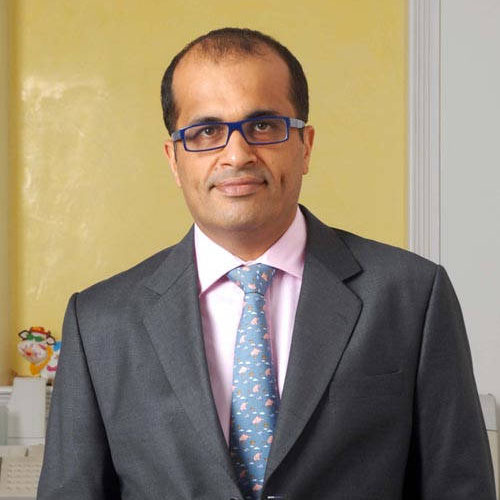
Agarwal: opportunities are going to open up further
The India franchise is a significant contributor to the global bank’s IBIT (Income before Income Tax) and ranked number three contributor in 2019, accounting for €392 million. With close to 13,000 employees, which includes Deutsche Bank and the technology centres, the country also accounts for the bank’s largest employee presence outside Germany. And, while the claim that many staffers make that India is the ‘jewel in the crown’ of the Deutsche Bank group may be a bit too self-laudatory, the truth remains that it scores much ahead of other geographies on the profitability quotient. A strict cost discipline, combined with business buoyancy, has kept the cost-income ratio of the India branches under 45 per cent.
Technology, primarily artificial intelligence and machine learning, is expected to play a big role in shaping the bank of the future and Deutsche Bank is keen on staying ahead. Rajesh Thakur, in addition to his Global Transaction Banking responsibilities, has also been tasked with leading the client coverage of fin-techs and platform initiatives for India and the ASEAN region. In May 2018, Deutsche Bank announced that it had acquired Quantiguous Solutions, a Mumbai-based software company, to help accelerate the build-out of the global transaction banking division’s application programme interface ecosystem.
Last year, as part of its global transformation strategy, Deutsche Bank announced it would be deploying as much as €13 billion to invest in technology to improve its operating systems so they are digital and scalable and would allow it to develop innovative products and services for its clients. In July this year, the bank announced a partnership with Google Cloud that would enable co-innovation between the two companies to create the next generation of technology-based financial products for clients.
The bank’s India technology centre is playing a key role in this. “How we use data and content is what will help us stay ahead of the game,” says Krishnan. With digital set to change the game for banks, the size of a bank’s branch network is becoming increasingly irrelevant. Deutsche Bank has 17 branches spread across 16 cities in the country.
Looking back on his early days in banking when the most sought-after place in the office was the computer room because it was the only air-conditioned room after office hours, Shaparia describes how banking has come a long way through the years. “In those days, you corresponded with the head office over telex. It was not easy to make an overseas telephone call. The lines were very bad. It’s hugely different now.”
But the theme of India as a geography with immense opportunity has held strong. “As India continues to open up and grow, it will take its rightful place in the world,” affirms Shaparia. “The country will require more overseas capital to realise its ambitions and this is where foreign banks like ours are going to continue to play a big role.”
Agarwal sums it up equally well by citing the example of the recent investments in Reliance Jio. “There is strong appetite among investors to put large amounts of capital into India which has, of course, surprised many people but it tells you a lot about the potential of this country,” he sums up.
-
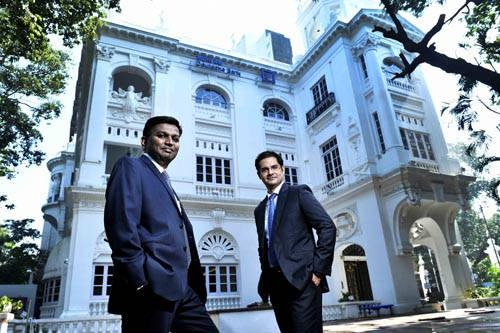
Krishnan and Thakur: trusted advisors to clients and companies
‘In the community’
While many other corporates have been paying lip service to the government’s ‘2 per cent formula’, Deutsche Bank is one of the few organisations that has diligently stuck to the mandatory CSR spend requirement every year since it came into force in 2014. Supported by staff volunteering, the bank’s projects span healthcare, access to water and livelihood generation. Since 2016, the programmes in India have impacted the lives of over one million people.
The bank’s CSR programme is covered under four broad pillars: ‘Born to Be’, which helps young people reach their full potential by developing employability skills, confidence and aspirations; ‘In the Community’, which addresses key concerns through local investment, donations and volunteer support; ‘Made for Good’, which supports micro-enterprises, start-ups and non-profits to advance new ideas and business models that can help them prosper and ‘Plus You’, which relates to employee volunteering and giving.
-
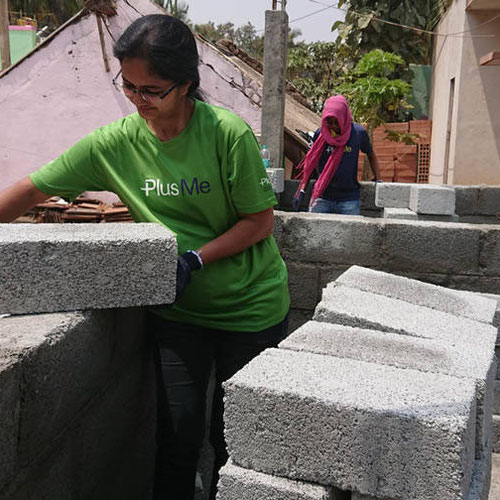
Not just lip service: the bank’s projects span healthcare, access to water and livelihood generation
Since the Covid-19 pandemic impacted India, Deutsche Bank has contributed over Rs15 crore to support more than 200,000 people across the country. Some notable interventions have included serving 1.8 million meals to daily wage earners and labourers and another 1,50,000 meals to healthcare workers, planting 40,000 fruit-bearing trees in the Raigad district of Maharashtra, providing 21,000 grocery kits to communities and distributing nutritional supplements and educational material to 40,000 children. The bank’s employees have also participated in these relief efforts by making financial donations and participating in a unique step-challenge to support one of its NGO partners. Through the pandemic, several Deutsche Bank employees have also conducted online classes and prepared educational material for children as schools remain closed.








































